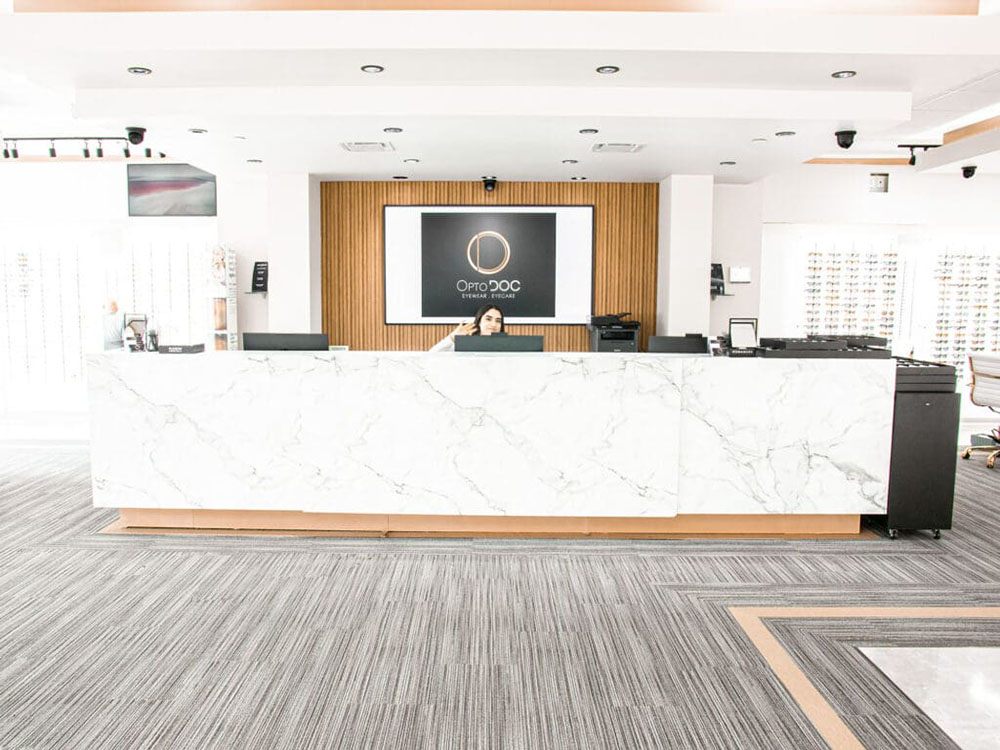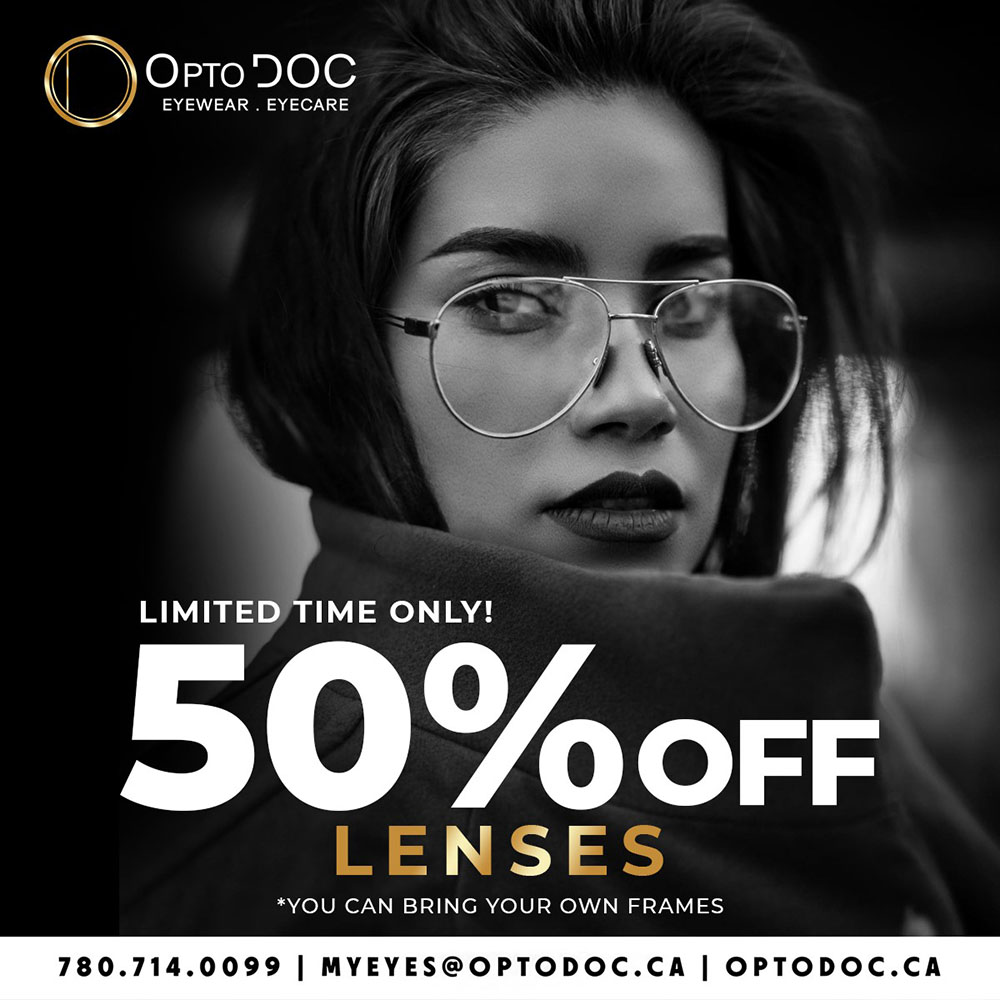WELCOME TO OPTODOC'S EYEGLASSES FAQs (FREQUENTLY ASKED QUESTIONS) PAGE!
Welcome to the Eyeglasses FAQ (Frequently Asked Questions) page at OptoDoc. Here, we aim to address common queries about eyeglasses, ensuring that you're well-informed when it comes to choosing the perfect pair of glasses for your vision needs and personal style.
Your Eyeglasses FAQ questions
The most asked questions about Eyeglasses FAQ
+ - How do I know if I need bifocals?
A common use of bifocals is for the treatment of presbyopia in individuals aged 40 and over. Whether or not a person has needed vision correction when younger, by the early to mid-forties, the ability to accommodate or focus the eyes has diminished.
Bifocals allow the wearer to see clearly both at a distance and near despite the reduced focusing ability. Bifocals may also be used to help align the eyes if a person tends to over-cross his or her eyes at near. If you are over 40 or have any difficulty performing tasks at near, ask us whether bifocals or progressive lenses could be right for you.
+ - How can I stop glare at night or at a computer?
There can be many causes for this condition. However, many times this problem can be alleviated, or even dismissed, with the use of "AR" (Anti Reflective) Lenses. First and foremost, however, annual or semi-annual eye exams are the ONLY avenue to your eye health and the ONLY resource to ascertain the correct reason or cause for any eye ailment! That being said and once any medical or physical condition is removed as a possibility of cause, then the perfect solution for glare on computer screens or glare from night driving would be AR (Anti Reflective) Lenses.
+ - Do sunglasses really help to keep my eyes healthy?
We cannot stress this enough...YES! You know how the sun's UV rays can harm your skin-wrinkles; premature aging and skin cancer are some of the dangers of unprotected sun exposure. The same rays that age and damage your skin can and will hurt your eyes as well. Strong sunlight and artificial light from sources like welding arcs or tanning lamps can burn the surface of the eye, much like a sunburn on the skin.
Reflected sunlight (from the water, for example) is particularly dangerous. There is also evidence that exposure to UV light can contribute to the development of eye diseases that commonly occur as we age, such as cataract and macular degeneration.
+ - Why are my lenses so thick?
With the newest contact lens designs and materials available today, our doctors are able to fit patients who may not have had success wearing contact lenses in the past. Whether due to poor vision, astigmatism, comfort issues, or dry eyes there are many more choices in contact lens materials to meet those challenges.
+ - Can the thick lenses be made thinner?
Absolutely! Newer, thinner lens materials are being developed all the time, and we pride ourselves in constantly being up-to-date with the latest developments and materials in the optical community. This, along with the proper grinding and appropriate frame selection could make your new fashion eyeglasses distinctly thinner. Ask one of our doctors or staff about the recent innovations in lenses today.
+ - Do regular glasses protect my eyes from the sun?
Plastic lenses do not protect your eyes. You need to have UV protection from UV rays, which are not inherent in a plastic lens. You can have a UV protective coating applied to a plastic lens, but polycarbonate lenses have built-in UV protection. Glass lenses protect your eyes from harmful UVB rays but not from UVA. Some experts think UVA rays might have long-term, damaging effects to your eyes and skin.
+ - Are the lenses that change colours OK for sunglasses?
Transitions Lenses are a popular plastic lens. When they're exposed to ultraviolet light, they become darker or change to a different colour. However, most brands are not as effective in a car or in any vehicle with the "blue or gray stripe" on a windshield. Because of the ultraviolet-blocking nature of the windshields, lenses will remain pretty light when you're driving. The ultimate sunglass experience can be enjoyed with "Polarized" Lenses, as these lenses offer protection and comfort to the eye so strain and fatigue can become a thing of the past. Transitions are a registered trademark of Transitions Optical, Inc.
We hope that our Eyeglasses FAQ has provided you with valuable information about selecting and caring for your eyeglasses. At OptoDoc, we understand that everyone’s vision needs and style preferences are unique. Our experienced opticians and optometrists are here to guide you through the process of finding the perfect pair of glasses that not only optimize your vision but also reflect your personal style.

If you cannot find the answer to your Eyeglasses question, please contact us
If you still have questions or would like to explore our extensive collection of frames and lenses in person, we invite you to visit our conveniently located Fort McMurray, AB clinic during our business hours. Our knowledgeable staff will be delighted to assist you in finding the ideal eyeglasses that meet your specific requirements. Hope this Eyeglasses FAQ section was useful!
Remember, regular eye exams are essential to ensure that your prescription remains accurate and your eye health is monitored. Book an appointment with our skilled optometrists to receive comprehensive eye care and personalized recommendations for your eyeglasses.
Thank you for reading through our Eyeglasses FAQ and for considering OptoDoc for your eye care needs. We look forward to providing you with exceptional service and helping you achieve optimal vision with stylish and comfortable eyeglasses.
















